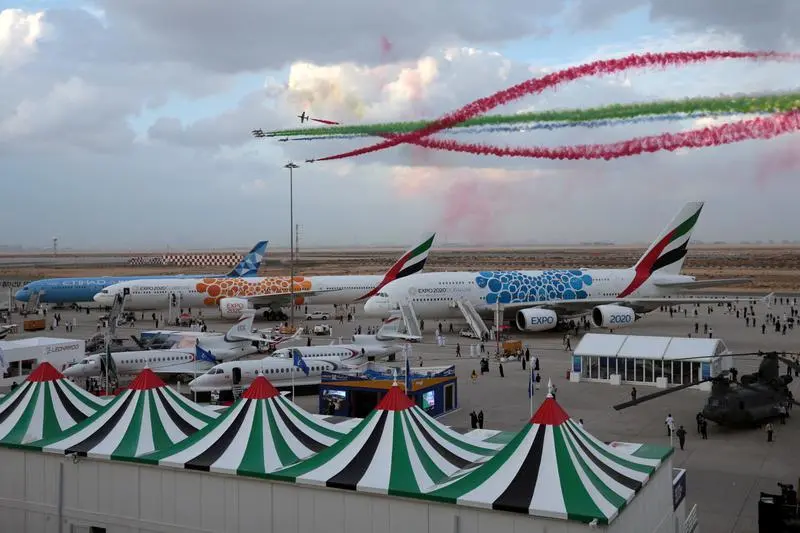PHOTO
The GCC states’ ‘big three’ airlines will cut more staff, delay plane orders and may never restore their flight networks to pre-pandemic levels, industry experts warn, as COVID-19 irrevocably changes business and leisure travel.
Dubai’s Emirates, Abu Dhabi’s Etihad Airways and Qatar Airways have been roiling less nimble competitors in other regions by providing superior customer service in gleaming aircraft.
But that impact has come at great financial expense – of the three, only Emirates is profitable – and the pandemic-enforced halt to operations has called into question their long-term strategies.
“This is the great industry reset because everybody is having to start from scratch – airlines are cutting staff, renegotiating contracts with cabin crew, flight crew, engineers, airports. Everything that has a cost attached is being reset and renegotiated,” said Saj Ahmad, Chief Analyst at StrategicAero Research.
The International Air Transport Association (IATA) forecasts the Middle East airline industry will lose $4.8 billion this year following a widespread halt to flights from late March.
Emirates urged staff to take paid or unpaid leave and reduced most employees’ salary by 25-50 percent, initially for three months but subsequently extended until September-end. Job cuts then began in May, with Emirates laying off a disclosed number of its 59,519 staff. A company spokeswoman declined to reveal the scale of job losses.
Qatar Airways’ chief executive Akbar Al Baker told the BBC that his firm, which lost 2.33 billion in the 12 months to March 31, 2019, would sack around 20 percent of its workforce. Etihad, which has lost $5.6 billion since 2016, has also made singeing cuts among its 20,520 staff and slashed salaries.
“Most jobs are linked to production so it will depend how much any given Gulf carrier reduces output, particularly if they ground aircraft for the long term – either putting them in storage or removing them from the fleet,” said John Strickland, a director at London’s JLS Consulting. “Etihad was already doing this prior to the pandemic. We’re likely to see further capacity reductions in the coming months and as a consequence more job losses.”
Dealing with the pandemic
As the spread of COVID-19 slows, Gulf economies are opening up again. Emirates is flying to more than 50 cities in July, down from 155 destinations before the pandemic. Company president Tim Clark told an Arabian Travel Market webinar, “we will see things moving back to some kind of normality during the course of 2021”, but also warned it could take four years to restore his airline to pre-pandemic operations.
To prepare for the turmoil, Emirates raised an extra 4.4 billion dirhams in the first three months of 2020, while the group had cash assets of 25.6 billion dirhams as of March 31. Even with these buffers, Dubai felt compelled to say it was “fully committed to supporting Emirates”, and the Gulf’s state-controlled airlines are widely expected to receive extra financial help from their owners.
“It’s inevitable – which airlines around the world aren’t receiving state aid? Not many,” said Ahmad.
The switch to homeworking will lead to lasting reductions in business travel as corporations opt for virtual meetings in order to save money and boost their green credentials. Business class and first-class seats are vastly more profitable, so the impact of this behavioural switch will be acute.
“(Routes) need to be rebuilt in stages, you can’t go back immediately to how things were before,” said Ahmad. “Otherwise if the demand isn’t there, the only way you’ll fill the airplanes is by pricing tickets uneconomically low.”
He warns Etihad and Qatar Airways are unlikely to renew their leases on their mammoth Airbus A380s when these expire. Each airline has a fleet of 10 A380s.
“The mix of aircraft will change in the future - we’re moving away from the ultra-large aircraft, although Emirates may be an exception with its large fleet of A380s expected to be around for some time to come,” said Strickland.
Aircraft are airlines’ biggest cost. The Gulf’s big three will now likely seek to defer aircraft orders, rather than cancel because that could cause them to lose their deposits.
In June, Qatar Airways’ CEO Akbar Al-Baker told Sky News his airline would not take any new planes it had ordered from Boeing or Airbus this year or next. Baker said plane deliveries due over the next 2-3 years would now take up to 10 years.
“Inevitably if you have less planes and demand is lower, I’d expect to see changes to networks,” added Strickland. “Fewer destinations are possible. Up until now, having a global network has been a strength, but everything is now under review.”
(Reporting by Matt Smith; Editing by Seban Scaria)
#GCC #AIRLINES #ETIHAD #EMIRATES @QATARAIRWAYS #JOBS #AVIATION
Disclaimer: This article is provided for informational purposes only. The content does not provide tax, legal or investment advice or opinion regarding the suitability, value or profitability of any particular security, portfolio or investment strategy. Read our full disclaimer policy here.
© ZAWYA 2020





















